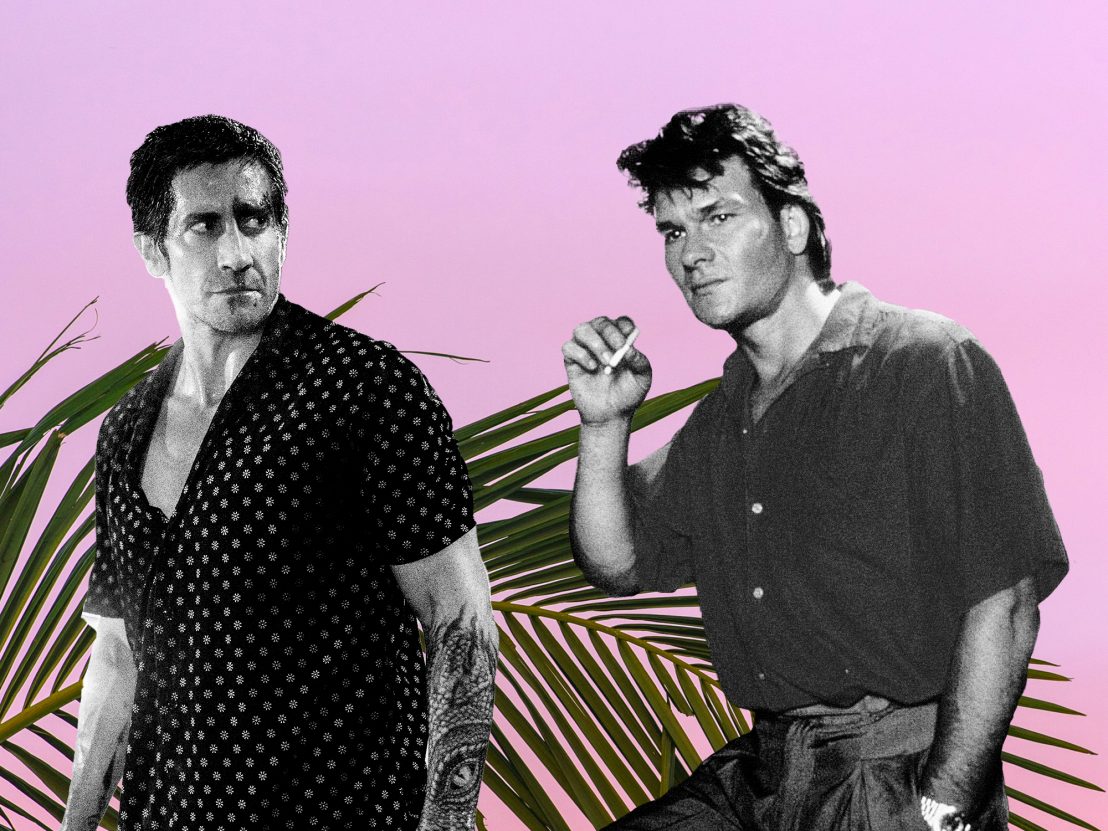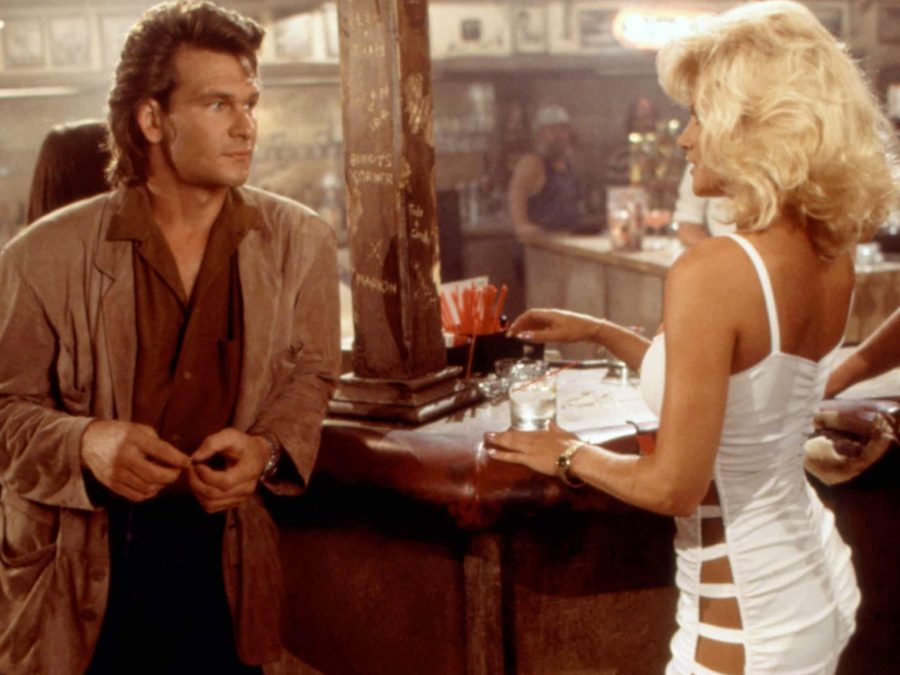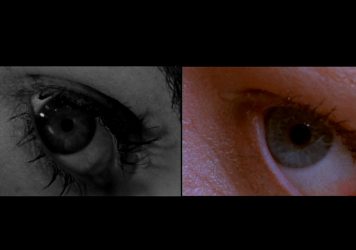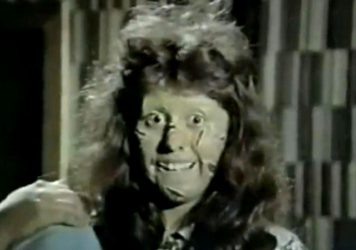
2024 feels too late for a Road House remake – a clear remnant of the ’80s nostalgia boom which dominated the previous decade, bringing us such “gems” as RoboCop, Red Dawn, and The Thing. Indeed, the notion first manifested in 2015 (with Ronda Rousey planned to star, another extremely mid-2010s cultural signifier), though that project is unrelated to the Doug-Liman-directed, Jake-Gyllenhaal-starring picture that has now hit Amazon Prime. As Hannah Strong has explicated on this site, it is mostly a dud, failing like so many other cinematic reimaginings to make a case for its existence. Its pleasures are fleeting and scattered (like how Conor McGregor walks like that guy from that one meme), as opposed to the consistent string of memorable lines and moments in the original.
The remake represents the last unexplored ’80s action movie rite of passage for Road House, which has already received an ironic Off-Broadway stage musical adaptation, a 2000s direct-to-DVD sequel featuring none of the original cast or crew, its own Family Guy running gag, and a Vinegar Syndrome special edition. The one box not ticked is the legacy-quel, a possibility sadly foreclosed by Patrick Swayze’s untimely death in 2009. I like to think that otherwise it surely would have happened by now; that Swayze would have returned as Dalton to show a new generation of winningly multiethnic, multigender young bouncers the ropes. Depending on the timing, it could have taken the form of a streaming series. What I’m saying is that in the universe wherein Swayze lives, MGM+ may be a major platform. Such was his power.
The 1989 Road House has an undeserved reputation for being “so bad it’s good” and for decades was one of the most popular targets for a cult audience of boring people who go through overly elaborate insincere rituals of claiming to only watch certain movies to make fun of them. This image formed not long after the film was released when it was nominated for five Golden Raspberry Awards. I first learned of it from a website I frequented in my teens that specialized in written “humorous” recaps of “bad” movies. (I must admit that, despite nothing of value being lost, I had a pang of nostalgic loss when while writing this article I looked up The Agony Booth for the first time in years and learned the site is now defunct.)
The “so bad it’s good” label is often slapped on any film that’s sufficiently off-kilter as to destabilize the viewer, and Road House is undeniably full of such distinctive moments: Dalton casually walking around nude in front of a co-worker, the absurd amount of violence and intrigue within a tiny Missouri town, and the many quotably over-the-top lines, including “I heard you had balls big enough to come in a dump truck”, “I used to fuck guys like you in prison!” and, of course, “Pain don’t hurt.”
The truth is that Road House represents an incredible pooling of America’s action cinema talent working at the height of their powers. There’s producer Joel Silver, director of photography Dean Cundey, editors John Link and Frank Urioste, stunt trainers and coordinators Benny Urquidez and Charles Picerni to name just a few of the folks bringing in countless hours of collective ass-kicking authority. It is in many ways a last hurrah for the ’80s action film, with all the decade’s love of low-subtext machismo distilled into the kind of sincere mix of Hawksian hangout and finely choreographed brutality that could have only been shepherded so sincerely by a man named Rowdy Herrington.

Swayze and Gyllenhaal’s respective takes on cooler king Dalton are the most emblematic division between the two films. Road House is one of the best showcases for Swayze’s effortless swagger – in contrast to most ’80s action heroes, he wasn’t roided-out or overtly macho, but lithe and catlike, patient in his coolness. (The perfection of this persona would come two years later with his portrayal of surfer bro criminal mastermind Bodhi in Kathryn Bigelow’s masterpiece Point Break, also remade with disappointing results.) Dalton can hobble multiple men at once without breaking a sweat, but he also embodies his mantra to “Be nice.” The reveal that he was an NYU philosophy major is a tremendous gag, but Swayze authentically holds himself as if he is in constant meditation – living the mindful lifestyle decades before the term was popular.
Gyllenhaal is trying something similar, with his Dalton doing his best to defuse tense situations and offer foes the easy way out. The best part of the new Road House is when, after beating the shit out of a biker gang, he then drives them all to the hospital. But his smile never reaches his eyes – this Dalton isn’t a zen master, he’s just barely containing his rage. Gyllenhaal’s natural demeanor is more than a little manic; his muscles are all taut as piano strings, and the corner of his eye seems to constantly twitch. His best roles, like the psychotically ambitious newsman Lou Bloom of Nightcrawler, take advantage of this. As Dalton, it means that not even he seems to buy his own nice-guy act. His interactions with locals and especially his version of the central romance lack any conviction.
That distinction illuminates the main difference between the Road Houses. The original is about mediating anger and having the restraint to deploy violence only when needed. When we learn that Swayze’s Dalton killed a man once, it’s genuinely surprising and recontextualizes both his practiced discipline and the aggression that his escalating conflict with Ben Gazzara’s local crime lord Wesley draws out of him. There’s actual gravitas and catharsis when he reaches his breaking point. The reveal of Gyllenhaal killing a man in the octagon (in the remake Dalton is a former UFC fighter, in another example of the film favoring expected lore where the original throws curveballs) would not shock even if the plot didn’t blatantly telegraph it. It’s just surprising he hasn’t killed more people.
It didn’t have to be this way. It could have even worked out that, despite Liman’s best efforts, the remake went straight to streaming. In a way, that’d make for a fitting parallel, for the fact that the original is such a classic of basic cable that one could believe it simply manifested one day on AMC. But the new Road House has none of the lived-in grit of the original, exemplified by how clean the alleged shithole titular roadhouse is. Another almost too obvious signpost: the roadhouse is now just called “the Road House,” whereas in the original it was the Double Deuce. There are naturally jokes about this, but such lampshade-hanging can’t absolve the remake’s skittishness toward any specificity. How can it then possibly hope to live up to a film that people still gleefully quote and endlessly rewatch today?
Published 4 Apr 2024

Doug Liman directs Jake Gyllenhaal in this mirthless unnecessary reimagining of the 1989 Swayze classic.

By Leigh Singer
A side-by-side video comparison of the seminal 1960 horror and its near-identical 1998 update.

By Josie Finlay
This scene-for-scene redo of William Friedkin’s horror classic has to be seen to be believed.